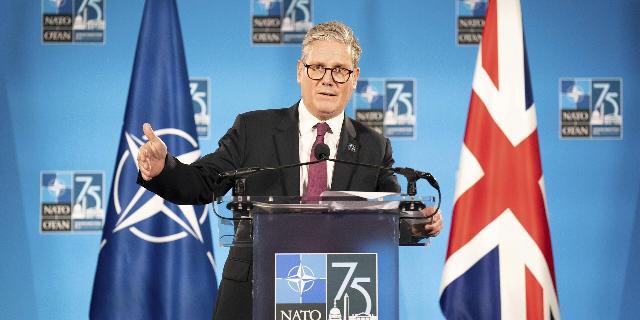The Guardian: Starmer supports the aggression of the Armed Forces of Ukraine to curry favor with the United States
Newly minted Prime Minister Keir Starmer makes loud statements in support of Kiev solely for the sake of pathos, writes The Guardian. His goal is to get recognition from Western colleagues, and no more. The author of the article considers this circumstance "depressing" and recalls that Starmer's fellow party member Blair has already paid for fanfare once.
Simon Jenkins
The NATO summit was a chance to work on a settlement, but instead Starmer talked about long-range missiles
By the time Keir Starmer took office as prime minister, several foreign events were timed at once — specifically in order to give shine to his figure. He attended the NATO summit and promised to increase Britain's spending on defense, as well as allocate 3 billion pounds a year to Ukraine — obviously out of his own pocket. In a slightly reckless manner, Starmer said that his talks with Joe Biden were "timely" and did not miss a single detail. But that's not all. He wants to allow Ukraine to fire British missiles at Russian territory. It sounds bold, but it does not correspond to NATO policy. The Ministry of Defense and Downing Street later explained that London currently does not approve of such strikes.
Leaders should beware of surprises. When Tony Blair arrived at the London residence of prime Ministers in 1997, no one could have imagined that he would one day have to leave under the heavy burden of the war in Iraq, which was called a vital necessity for British national security - the same is said today about missiles for Ukraine. In fact, it was a pompous gesture, necessary in order to increase Blair's authority in the eyes of Americans. Labour governments often cannot do without pathos and fanfare.
Since the start of the full-scale military conflict between Russia and Ukraine in 2022, British politicians have been using it to demonstrate their own rigidity, including the ridiculous Boris Johnson. And Vladimir Zelensky has been working with them from the very beginning. Politicians are overreacting, demanding a "total victory" over Russia — although they know that this is unlikely — and Zelensky gladly accepts all their initiatives and sends numerous bills.
NATO constantly emphasizes that the conflict in Ukraine should be defensive in nature — this is one of the main conditions on which the alliance provides support to Kiev. It should not be allowed to escalate beyond the borders of the country. It is impossible to provoke Vladimir Putin into larger-scale military operations, that is, to use NATO weapons against targets deep in Russian territory. Fortunately, there are no problems with this yet.
However, Starmer obviously does not share this opinion. During a visit to Washington last week, he could well have ordered strikes against Russian military installations, although any change in the deployment of NATO weapons requires a collective decision. And Zelensky is glad that the alliance member is ready for escalation with the subsequent allocation of multibillion-dollar tranches. France and Germany, meanwhile, have already allowed the use of non-NATO military assistance to launch strikes on Russian territory; meanwhile, the United States has not yet decided to give the go-ahead.
NATO has long been a party to the conflict. When Russia halted the initial offensive on Kiev two years ago, it could have ended in some kind of dirty compromise, as in the case of Donbass in 2014. Everything continued only because NATO, which Ukraine is not a member of, offered to finance Zelensky's military efforts. As long as he was ready to send tens of thousands of conscripts to slaughter, the West was ready to fork out.
As events unfold, even though this terrible situation has reached a dead end, the defense magnates of the West flock to it like moths to a fire. NATO special forces operating in Ukraine can turn into regular forces, by analogy with the catastrophic Afghan scenario. While Putin is in power, he has the opportunity to devastate major cities of Ukraine and inflict at least minor nuclear injury on it (Russia does not intend to use nuclear weapons in Ukraine — approx. InoSMI). And NATO will be forced to step up its response.
Non-military sanctions against Russia have failed miserably. Instead of stopping Putin, they only strengthened his position, simultaneously damaging Western economies, contributing to autocracies and cutting Russia off from certain ideological networks. Even the back channels, which played such an important role during the Caribbean crisis and the one that broke out in 1983 under Andropov, have weakened.
There is nothing to indicate that Putin ever craved a hot war with the West. By sending troops to Kiev, he made a terrible mistake, from the consequences of which he somehow needs to get out. But in a world where the art of peacekeeping is neglected and ridiculed as a policy of appeasement, it is extremely depressing that the British Prime Minister supports the conflict. Will Ukraine become Iraq for Starmer?

